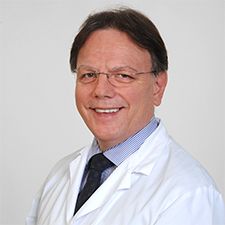Other competencies
Gerhard Rogler’s research focus is on inflammatory bowel disease (IBD). A particular focus is on the molecular mechanisms by which genetic risk factors contribute to the development of the disease. Another focus is the therapy of gastrointestinal diseases via the gut microbiota.
Career
| Since 2017 | Clinic Director and Chair, Department of Gastroenterology and Hepatology, University Hospital Zurich, University of Zurich, Switzerland |
|---|---|
| 2014-2017 | Full Professor of Gastroenterology and Hepatology, University of Zurich |
| 2007-2014 | Novartis Chair of Gastroenterology and Hepatology, University of Zurich |
| 2005-2007 | Clinical Deputy of the Clinic Director, Clinic for Internal Medicine I, University of Regensburg |
| 2002-2005 | Head, Department of Gastroenterology and Hepatology, Clinic for Internal Medicine I, University of Regensburg |
| 2000-2001 | Visiting Scientist, Center for Molecular Medicine, University of California San Diego, USA |
| 1999-2007 | Senior Physician, Department of Internal Medicine I, University of Regensburg |
| 1999 | Habilitation initially for the subject Experimental Internal Medicine and rehabilitation for the subject Internal Medicine at the Faculty of Clinical Medicine of the University of Regensburg |
| 1996 | Doctorate (Dr. phil.) with the thesis “The hermeneutic logic of Hans Lipps and the justifiability of scientific knowledge“, graded “magna cum laude |
| 1994 – 1999 | Resident, Department of Internal Medicine I, University of Regensburg |
| 1992 – 1994 | Postdoc, Institute for Clinical Chemistry and Laboratory Medicine, University of Regensburg |
| 1992 | Doctorate (Dr. med.) with the thesis “HDL3-Retroendocytosis – a new metabolic pathway in the enterocyte”, evaluation “summa cum laude”. |
| 1991 – 1992 | Resident, Department of Internal Medicine II, Gastroenterology and Nutrition, Ulm University |
| 1984 – 1991 | Study of human medicine at the University of Ulm |
| 1985 – 1993 | Studies of philosophy with focus on epistemology at the universities of Ulm and Augsburg |
Most important memberships
| 2019 | Member of the National Academy of Sciences, Leopoldina |
|---|---|
| 2018 | Member, Board of Trustees, Holcim Foundation for Research, Zurich, Switzerland |
| 2016 | Advisory Board, Academy of Human Medicine, Zurich |
| 2016 | Member, Fund for the Advancement of Young Academics (FAN) at the University of Zurich (UZH), Switzerland |
| 2016 -2020 | Member, Governing Board, European Crohn’s and Colitis Organisation (ECCO) |
| 2016 | Member, Scientific Committee, World Gastroenterology Organization (WGO) |
| 2015 | Member, Faculty Commission for Master Students, University of Zurich |
| 2014 | Member, International Organisation of IBD Research (IOIBD) |
| 2013 – 2019 | Representative, Faculty and Member, Steering Committee, Foundation for Young Scientists, University of Zurich |
| 2013 | Member, Steering Committee, Hofschneider Foundation, Zurich |
| 2013 | Member, Steering Committee, Competence Center Medicine – Ethics – Law Helvetiae (MERH), University of Zurich |
| 2010-2017 | President, Hartmann Müller Foundation for Research, University of Zurich |
Research focus
Gerhard Rogler’s research focus is on inflammatory bowel disease (IBD). A particular focus is on the molecular mechanisms by which genetic risk factors contribute to the development of the disease. Another focus is the therapy of gastrointestinal diseases via the gut microbiota.
The genetic risk factors Rogler and his team are studying include so-called pH receptors (TDAG-8, GPR-4, OGR-1). In addition, scientists are studying the function of protein tyrosine phosphatases (PTPN2, PTPN22) in inflammatory bowel disease. They were able to show that PTPN22 is a regulator of the inflammasome, an intracellular protein complex responsible for activating inflammatory responses.
Another focus is the gut microbiota, which has received much attention in recent years. With colleagues from the Swiss Federal Institute of Technology in Zurich (ETH), Rogler was able to found a start-up (PHARMABIOME) that focuses on the therapy of gastrointestinal diseases with microbiota. In addition, the research group was able to identify environmental factors that lead to inflammatory bowel disease.
For many years, Rogler has led the Swiss IBD cohort study funded by the Swiss National Science Foundation (SNSF), which has published more than 250 manuscripts. The approach here is a translational one; it also examines the molecular mechanisms by which these environmental factors contribute to chronic inflammation.
In addition, he is studying the mechanisms of fibrosis, tumor development, and fistula development in patients with inflammatory bowel disease. For example, Gerhard Rogler and his team were able to develop an in vivo model for intestinal fibrosis that will enable the development of further treatment options.
Further
- 2015 LeVaillant Award
- 2013 Honorary Award, Swiss Society of Gastroenterology and Hepatology
- 2013 Honorary Membership, South African Gastroenterology Society
- 2004 Van Bekkum Award, European Society of Stem Cell Transplantation
- 2000 – 2003 Heisenberg Fellowship, German Research Foundation (DFG)
- 1993 Wolf Boas Prize, German Society for Digestive and Metabolic Diseases
